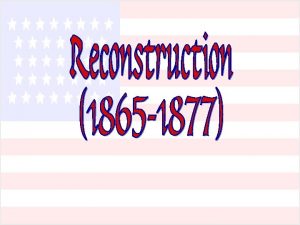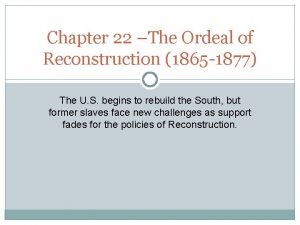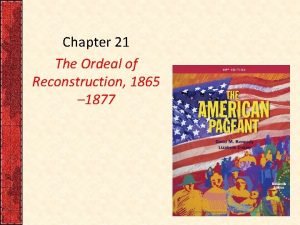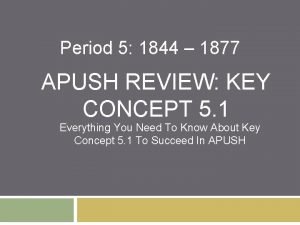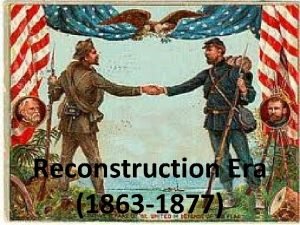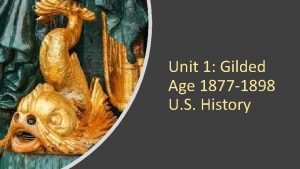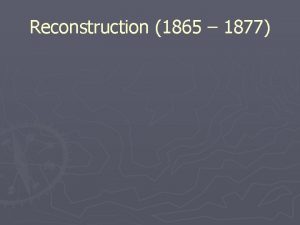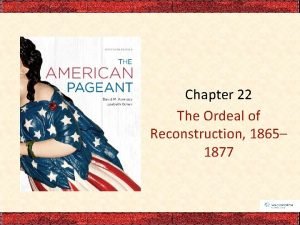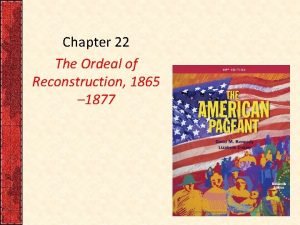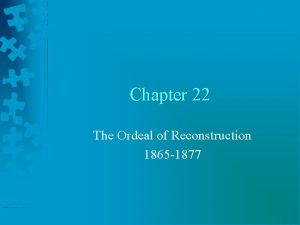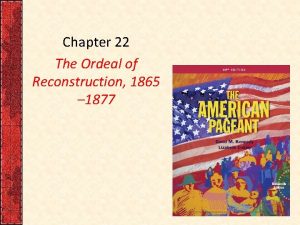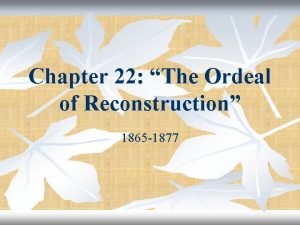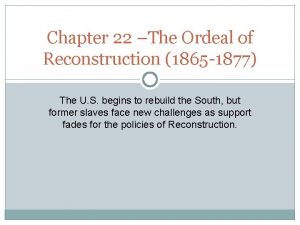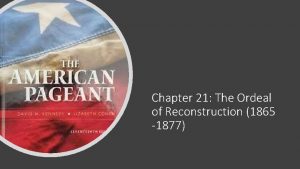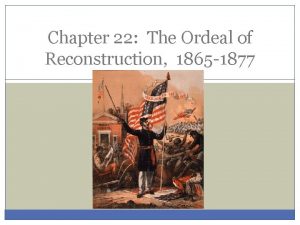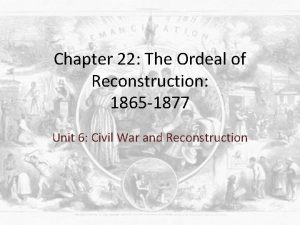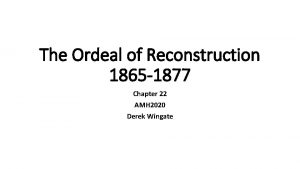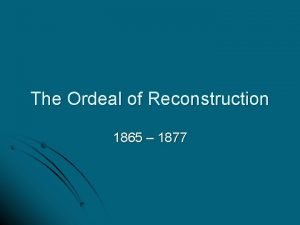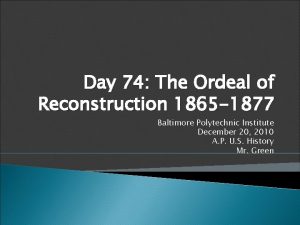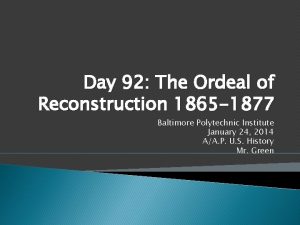CHAPTER 22 THE ORDEAL OF RECONSTRUCTION 1865 1877






















- Slides: 22

CHAPTER 22 THE ORDEAL OF RECONSTRUCTION 1865 -1877

DIFFICULTIES OF RECONSTRUCTION • Lincoln assassinated • Needed to decide how to bring Southern States back • After the war, Southern people continued to believe that their view of secession was correct • Many Northerners wanted to punish the South • Needed to decide how to support the newly freed African Americans

RECONSTRUCTION PLANS

CONGRESS VS. PRESIDENT • Disagreement between Pres. & Congress revealed differences in Republicans & two factions arose within party: • Majority - agreed with Lincoln & believed that seceded states should be restored to Union as quickly as possible • Radical minority - felt South should suffer greatly before its readmittance - wanted South's social structure to be uprooted, the planters to be punished, and the newly-emancipated blacks to be protected by federal power

LINCOLN’S RECONSTRUCTION PLAN • "10 percent" Reconstruction plan - 1863 • State could be reintegrated into Union when 10% of its voters in the presidential election of 1860 took an oath of allegiance to US and pledged to abide by emancipation • Then, formal state gov’t would be constructed within state, and then it would be re-admitted into the Union • Due to Republican fears over the restoration of planter aristocracy and possible re-enslavement of blacks Congress passed Wade-Davis Bill - 1864 • Required 50% of state's voters take oath and demanded stronger safeguards for emancipation • Lincoln refused to sign

JOHNSON’S PLAN • Strong supporter of State’s Rights • Southerner who did not understand the North and a Democrat who had not been accepted by the Republicans. • May 1865 - Called for special state conventions which were required to: • repeal decrees of secession • repudiate all Confederate debts • ratify slave-freeing 13 th Amendment. • States that agreed to these concessions would be readmitted • Pardoned all rebel leaders

CONGRESSIONAL RECONSTRUCTION • December 1865 - Southern states represented themselves in Congress with former Confederate generals and colonels • This time South would have much more control in Congress due to the fact that the South had a larger population (no more 3/5 clause) • Republicans feared South would take control of Congress • President Johnson announced December 6, 1865 that Southern states had met his conditions and that Union was now restored • Angered Republicans especially Radical faction

REPUBLICAN PLAN • Charles Sumner led Republican radicals in the Senate & Thaddeus Stevens led the radicals in the House • Fought for black freedom and racial equality • Moderate Republicans, the majority in Congress • Preferred policies that restrained the states from cutting citizens' rights, rather than policies that directly involved the federal government in individual lives

ACTUAL RECONSTRUCTION PLAN • Military Control of South • Passing of Freedman’s Bureau • Reconstruction Acts • 13 th Amendment, 1865 • Abolished slavery • 14 th Amendment , 1866 • Established citizenship of all • Equal protection under the law no matter the race • Passing of 15 th Amendment, 1869 • African Americans the right to vote

MILITARY RECONSTRUCTION • March 2, 1867 - Congress passed Reconstruction Act • Divided South into 5 military districts, each commanded by a Union general and policed by Union soldiers • Required states wishing to be re-admitted into Union had to ratify 14 th. Amendment, and that states' constitutions allowed former adult male slaves to vote • Moderate Republican goal was to create voters in Southern states that would vote those states back into the Union and thus free the federal government from direct responsibility for the protection of black rights • Military Reconstruction of the South took control of certain functions of the president and it set up a military rule of the South • 1877 - last federal troops removed from South and Democracy returned to South (in theory)

FREEDMEN'S BUREAU • Many freedmen (people who were freed from slavery) were unskilled, without property or money, and had little knowledge of how to survive as free people • March 1865 - Congress created Freedmen's Bureau • Provided clothing, medical care, food, and education to both freedmen and white refugees • Greatest success was teaching blacks to read • Start of Black Schools and the foundation of HBCUs • Because it was despised by President and by Southerners, expired in 1872

RESPONSE TO RECONSTRUCTION

NEW LIFE FOR FREEDMEN • Emancipation took effect unevenly in different parts of the conquered Confederacy • Church became focus of black community life in years following emancipation • Formed their own churches pastured by their own ministers, and they had an opportunity for education • Blacks could now learn to read and write

JOHNSON & CONGRESS CLASH • February 1866 - Pres vetoed bill extending Freedmen's Bureau • In response, Congress passed Civil Rights Bill in March 1866 • Gave Blacks privileges of American citizenship • Congress overruled the President's veto • Fearing Southerners might repeal Civil Rights Law, Congress passed 14 th Amendment - 1866 • 1) Gave civil rights, including citizenship, to freedmen • 2) Reduced proportionately the representation of a state in Congress and in the Electoral College if it denied blacks the right to vote • 3) Disqualified from federal and state offices former Confederates who, as federal officeholders, had once sworn to support the Constitution of the United States • 4) Guaranteed the federal debt, while the Union assumed all Confederate debts. • With the ability to overrule a presidential veto, Congress began to develop into the dominant role in controlling the government • All Republicans agreed that no state should be welcomed back into the Union without ratifying the 14 th Amendment

BLACK CODES • Series of laws designed to regulate affairs of freedmen • Mississippi passed first law - 1865 • Aimed to ensure stable and subservient labor force • Sharecropping Established • Plantation owners rented out pieces of their land to Blacks and make cost of rent higher than the return the land produced • Renters of land were bound by contract to continue to work land until debts were repaid to the plantation owner • Unable to repay debts, blacks began to "jump" their contracts • Codes imposed harsh penalties on Blacks who "jumped" their labor contracts, some of which usually forced them to work for same employer for one year • Sought to restore pre-emancipation system of race relations • Forbade Blacks to serve on a jury or to vote • Mocked idea of freedom and imposed terrible hardships on the newly freed people • Republicans strongly opposed to Black Codes

THE KU KLUX KLAN • "Invisible Empire of the South", otherwise known as the Ku Klux Klan • Founded in Tennessee in 1866 • Formed by disgruntled white Southerners who were angered by the success of black legislators • Group worked through intimidation • Congress passed Force Acts of 1870 and 1871 in response to murders that Klan had committed • Acts enabled Federal troops to stop atrocities of the Ku Klux Klan • Came too late, though, as the Klan had already intimidated many people

WOMEN’S RESPONSE • Many Feminists angered that 14 th and 15 th Amendments gave rights to black males, but not to women • Many of most out spoken white suffragists felt betrayed and began to speak out against African Americans and 14 th and 15 th amendments

RESULT OF RECONSTRUCTION

REALITIES OF RADICAL RECONSTRUCTION • After gaining right to vote from 15 th Amendment, African Americans began to organize politically • In first presidential election – elected Ulysses Grant in landslide vote • Strong participators in Union League, originally a pro-Union organization • Freedmen turned Union League into a network of political clubs that educated members and campaigned for Republican candidates • Also built Black churches and schools, represented black grievances before local employers and governments, and recruited militias to protect black communities from white retaliation • From 1868 -1876 - Blacks began to hold major offices in government • Hiram Revels - 1 st African American Senator • "Scalawags" - Southerners who were accused of plundering treasuries of Southern states through their political influence in radical governments • "Carpetbaggers" - Northerners who had come to South to seek power and profit

JOHNSON IMPEACHMENT • Congress passed Tenure of Office Act in 1867 • Required president to secure consent of Senate before he could remove cabinet members once they had been approved by Senate • Purpose was to keep the secretary of war, Edwin M. Stanton (a spy for the Republican party), in president's cabinet • 1968 - Johnson dismissed Stanton • House of Reps voted to impeach Johnson for "high crimes and misdemeanors” • Johnson argued the Act was unconstitutional and wanted to challenge it before Supreme Court • May 16, 1868 - Senate voted the president "not guilty" by a margin of one vote

PURCHASE OF ALASKA • 1867 – Sec. of State Seward signed treaty with Russia that gave Alaska to US for $7. 2 million • Russia sold Alaska because it felt it was over-expanded in North America • Wanted to strengthen US as a barrier against Britain • Many Americans supported the purchase because Russia helped them during the War • Some did not support it saw it as useless and removed focus from Reconstruction • Seward's Folly

RESULTS OF RECONSTRUCTION • Many white Southerners felt it was more painful than the war itself • Republican Party wanted to protect the freed slaves and to promote the fortunes of the Republican Party • This removed party from South for nearly 100 years • Despite good intention, it did not change the way that South treated or viewed blacks • Radical Republicans program of drastic economic reforms and extensive protection of political rights would have led to equality between the races never enacted • Reconstruction eventually ends in 1877 • Compromise of 1877 – Hayes agrees to remove troops from South if election went to him
 1877-1865
1877-1865 The ordeal of reconstruction
The ordeal of reconstruction Chapter 22 the ordeal of reconstruction
Chapter 22 the ordeal of reconstruction Ordeal chapter 22
Ordeal chapter 22 Ordeal chapter 21
Ordeal chapter 21 Lesson 1 the rise of industry
Lesson 1 the rise of industry What is the supreme ordeal in the odyssey
What is the supreme ordeal in the odyssey Trial by ordeal definition
Trial by ordeal definition Ordeal by cheque activity
Ordeal by cheque activity Supreme ordeal definition
Supreme ordeal definition Ordeal by cheque assignment answer key
Ordeal by cheque assignment answer key Ordeal by cheque interpretation
Ordeal by cheque interpretation Georgia history timeline 1877-1919
Georgia history timeline 1877-1919 Haymarket square riot apush
Haymarket square riot apush Apush period 5 key concepts
Apush period 5 key concepts Compromise of 1877
Compromise of 1877 Gilded age strikes
Gilded age strikes Whats the compromise of 1877
Whats the compromise of 1877 1877 golden 1
1877 golden 1 Tanssija 1877-1927
Tanssija 1877-1927 Define reconstruction era
Define reconstruction era The gilded age 1877 to 1898 worksheet answers
The gilded age 1877 to 1898 worksheet answers 1894 railroad strike
1894 railroad strike
